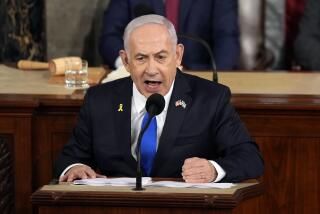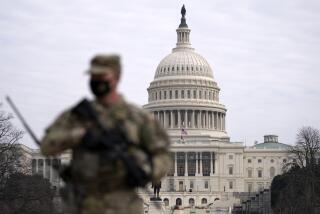Congress Approves Defense Bill That Blocks B-2s, Expands SDI
WASHINGTON — Congress on Friday approved and sent to President Bush a $291-billion defense authorization bill for fiscal year 1992 that blocks Bush Administration plans to build more B-2 Stealth bombers but opens the way for deployment of a new anti-missile defense system.
The Senate approved the bill by a vote of 79 to 15, with most of the dissent coming from liberal Democrats opposed to more spending for the Strategic Defense Initiative, under which the anti-missile defenses would be built.
The House had approved the final version of the bill on Nov. 15 by a 329-82 vote.
Bush is expected to sign the measure, which reflects efforts by the Administration and Congress to reshape the nation’s defenses in light of the diminishing military threat from the Soviet Union.
The bill repeals the ban on assignment of women to fly combat aircraft for the Navy and Air Force and creates a commission to recommend whether other combat roles, including those of the Army, should be opened to women.
Bush had asked for four more B-2 bombers, and the Senate went along. But the House voted to halt production after completion of the 15 planes that have been funded, objecting to the cost of the $865-million-per-copy bombers and to performance of the planes in tests of their radar-evading capabilities.
In the biggest blow to the program, House-Senate negotiators agreed to provide only enough money to keep the Northrop Corp. production line open and to allow purchase of one more plane if Congress voted specifically to do so, a dubious prospect in light of House opposition to more B-2s.
The bill allocates $4.15 billion for SDI, a substantial increase over current spending of $2.9 billion but considerably less than the $5.15 billion that Bush had requested.
As part of a sharply revised SDI, which is far less ambitious than the “Star Wars” program initiated by former President Ronald Reagan, the bill calls for deployment by 1996 of an initial, ground-based system of 100 interceptors capable of shooting down incoming missiles. It also seeks negotiations with the Soviets to amend the 1972 Anti-Ballistic Missile Treaty to permit deployment of more such systems.
In a reflection of the reduced Soviet threat, the bill also would cut U.S. armed forces by 106,400 active duty personnel by the end of the fiscal year. A 4.2% military pay raise was approved to begin Jan. 1.
More to Read
Get the L.A. Times Politics newsletter
Deeply reported insights into legislation, politics and policy from Sacramento, Washington and beyond. In your inbox three times per week.
You may occasionally receive promotional content from the Los Angeles Times.










